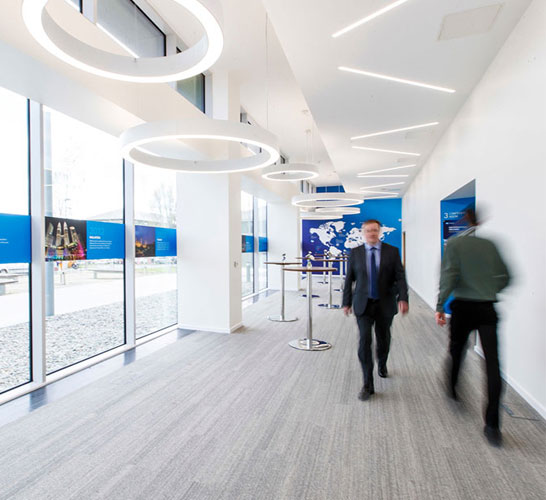Strategic Advisory
To find out more about our world-leading strategic and advisory services, visit:
In our ever-changing world, addressing the pressing issue of climate change and transitioning towards green energy sources has become an imperative. Higher instances of environmental calamities such as drought, flooding, and wildfires, as well as general temperature increases, are making agriculture less sustainable, cities less habitable and are all having a pronounced negative impact on economies.
These social and environmental impacts are disproportionately felt in developing countries still trying to pursue economic development to raise their populations out of poverty. Decarbonising an economy in an equitable and stable economic environment can happen, and International Financial Institutions (IFIs) are playing a pivotal role in assisting developing economies in their journey towards decarbonisation and the adoption of renewable energy.
In response to this growing crisis, the United Nations Sustainable Development Goals were drawn up. In energy terms, Goal 7 - Affordable & Clean Energy, Goal 9 - Industry, Innovation & Infrastructure, and Goal 13 - Climate Action, and the need for a green energy transition are key. Following the lead and ambition of these goals, and many other initiatives (the Paris Agreement, etc.), IFIs are increasingly financing new renewable electricity projects worldwide.
The goal is clear - affordable and clean access to electricity. And who wouldn't be excited about the prospect of a brand-new wind or solar farm? Silent sentinels that harness the power of the wind while creating copious quantities of clean, renewable energy. Governments like them, utilities like them, and IFIs like them. They are crucial to a green energy transition and vital for decarbonising an economy.
Renewable generation in the green transition, however, presents a unique set of challenges:
However, these challenges are manageable and should be addressed. Resilient transmission and distribution networks can be built accordingly, plans can be developed, and grids can be designed to be sufficiently robust to facilitate new renewable energy. Leveraging our extensive experience in Ireland, ESB International is well-positioned to support the development of a modern grid network that can handle newly decarbonised production. We have developed, maintained and operated resilient electricity generation, transmission, and distribution infrastructure in Ireland for almost 100 years and internationally for five decades - transforming utilities, integrating renewables, maintaining generation capacity, and supporting and collaborating with the economies and utilities we work with. We understand the utilities' challenges because we are an integral part of one.
Effective energy transition must be viewed as a whole product, not simply a new capital project. Physical infrastructure and a robust regulatory environment are critical to optimise assets. Effective plant management, maintenance and decommissioning, proper grid integration and local capacity development are essential to make a green energy transition sustainable in the long term. Otherwise, IFIs are simply sending 'good money after bad' and developing economies do not get the total value of funding and end up returning year-on-year for more assistance in an endless cycle. This results in IFIs missing out on long-term strategic development goals.
In developing economies, new sources of electricity are transformative, impacting society and political careers. The pressure on utilities, governments, and IFIs to provide renewable generation assets is immense. However, the effectiveness of a renewable generation asset is contingent on a robust transmission and distribution network. The network must be capable of handling the variable and fluctuating nature of renewable energy generation.
Drawing on our unique experience, we collaborate with our clients to navigate regulatory, technological, and environmental challenges to deliver robust electricity infrastructure. As the world embraces low-carbon solutions, we have the expertise to guide our clients on that journey safely and are driven to make a difference.
Having faced the challenges of adopting high volumes of renewable energy in our home market, we have learnt the importance of dynamic, adaptive network management, extending the useful lifetime of existing assets, careful decommissioning, balancing baseload, and integrating new renewable energy on the grid. A quality network is a crucial element of a green energy transition. ESB International is bringing this expertise to utilities worldwide to help them on their decarbonisation journey.
To find out more about our world-leading strategic and advisory services, visit:

To find out more about our world-leading strategic and advisory services, visit:
 Simon Leyden
Business Development Manager, International Financial Institutions
Simon Leyden
Business Development Manager, International Financial Institutions
Simon Leyden is a Business Development manager at ESB International, focusing on our relations with International Financial Institutions (IFI). Simon has worked in Project Finance, specialising in traditional and alternative energy for over 15 years. During that time, he has worked with several financial institutions in Ireland and abroad, including time with the European Investment Bank – the European Union's Climate Bank in Luxembourg.
Simon brings expertise in understanding energy policy, international finance, large-scale project finance, and the application of development bank finance to energy projects, especially in Developing Economies. Simon has a B.A. (Joint Hons) in Economics and Geography from Trinity College Dublin and an MSc in Economic Policy from the University of London (School of Oriental and African Studies).
The experience ESB International brings as a utility-based consultancy to our parent company ESB, which is transitioning to a low-carbon energy future based on clean, reliable, affordable electricity, lends itself perfectly to further collaboration and knowledge sharing in the region.


